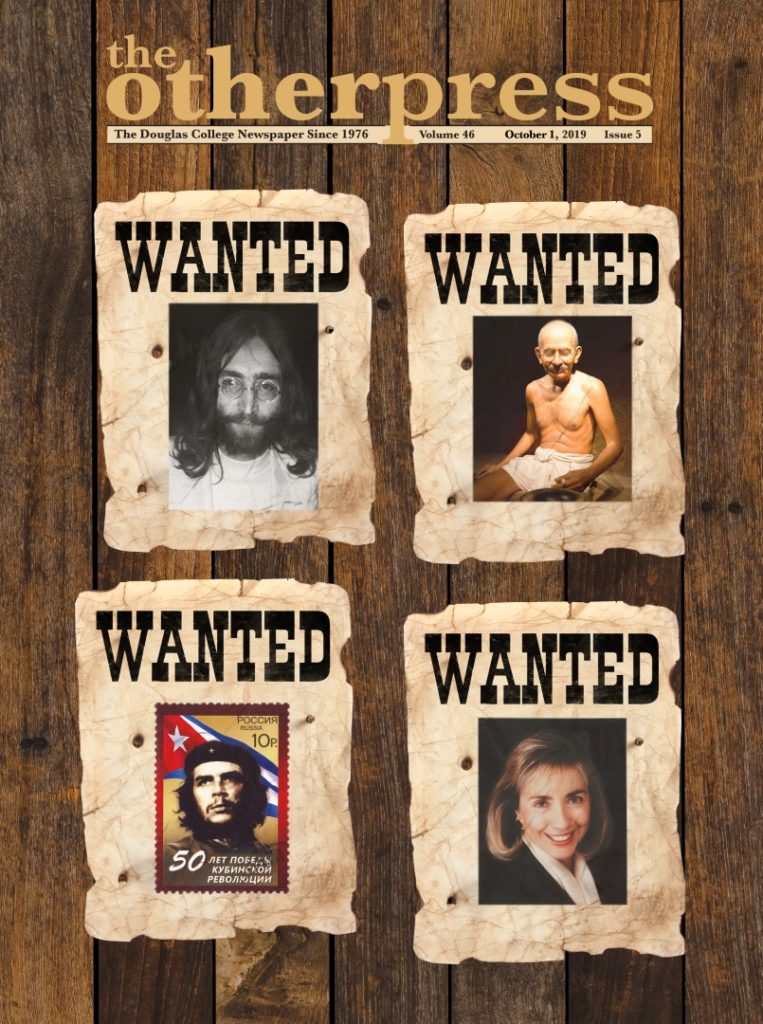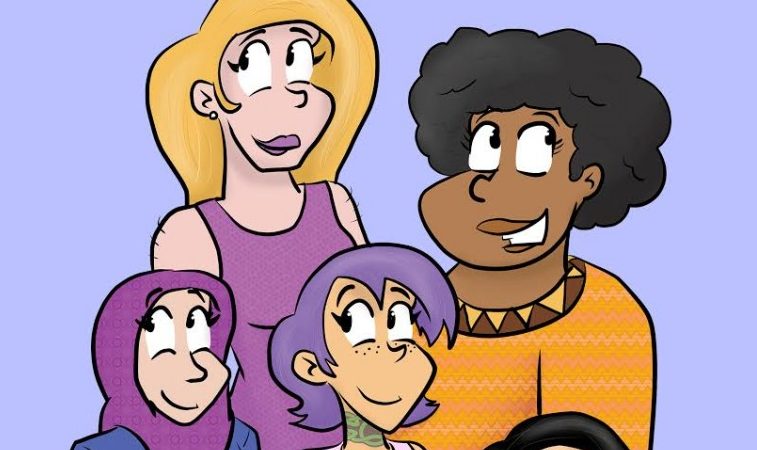
An investigation of Gandhi and other icons with allegedly messy pasts
By Jessica Berget, Editor-in-Chief and Janis McMath, Assistant Editor
Before we dive into this piece, we want to state the disclaimer that we do not intend to say that controversial figures with alleged problematic pasts should be totally discounted and ignored because of their faults.
With this piece, our main intent is to highlight that figures that many idolize are also human, and flawed—and we want to highlight that any claim that they are perfect or worthy of a reputation that implies as such should be refuted.
Whenever any of us plan to identify ourselves with and praise figures, we must ensure that we acknowledge their short-comings too—otherwise we represent them incorrectly. Our icons can be flawed, but we cannot ignore those flaws. Ignoring our idol’s shortcomings while simultaneously praising them is to normalize, accept, and to some extent, align ourselves with that bad behaviour.
So just in time for Gandhi’s birthday on October 2, here are a few people associated to freedom, peace, and liberation that have allegations of terrible actions pit against them.
Mahatma Gandhi
Gandhi may be the most recognized symbol of peace. He led his country of India to independence from the British empire and was an advocate for non-violent movements. Because of this, many regard him as a brave, compassionate, and wise soul. His various inspirational quotes can also be seen in many public institutions. However, is the Gandhi we commonly see posters of as pure as his image appears to be?
Apparently not. According to articles both by the Independent and The Guardian, Gandhi had some weird conceptions about sex and displayed some predatory behaviours. After taking a vow of celibacy, he would allegedly sleep naked with underage girls, including his 18-year-old great niece, in order to test his celibacy.
He also had some toxic attitudes towards victims of sexual assault. According to the previous article, “Gandhi believed Indian women who were raped lost their value as human beings.” He also believed women’s menstruation was a “manifestation of the distortion of a woman’s soul by her sexuality,” according to Rita Banerji’s book “Sex and Power.”
Finally, Gandhi had some less than ideal notions about South Africans calling them “Kaffirs,” a derogatory slur. He wrote in a letter in 1904, “About the mixing of the Kaffirs with the Indians, I must confess I feel most strongly.”
John Lennon
Many people’s favourite Beatle, John Lennon, has been praised as an emblem of peace since his character reformation in the ‘70s, with both the solo debut of “Imagine” and him and Yoko Ono’s bed-in protest for peace. With this common representation of the English legend, it may be strange to hear anything negative—such as the fact that in an 1980 interview with Playboy, he admits that his violent nature is admitted in song.
In the Beatles song “Getting Better,” Lennon explains that the lyrics “I used to be cruel to my woman, I beat her and kept her apart from the things that she loved,” were based on his real-life experiences. On the topic of the lyrics, he says “I was a hitter. I couldn’t express myself and I hit. I fought men and I hit women.”
Cynthia Lennon, John Lennon’s first wife and mother of his first child, has several experiences of this. According to a BBC interview with her, one night when Cynthia and John were out, John saw her dancing with a male friend of hers. John later caught up with her and smacked her across the face—hard enough to knock her head into the pipes behind her. Yoko Ono also allegedly experienced similar violence. According to the book Lives of Lennon, John Lennon was allegedly so violent that he was responsible for one of Yoko Ono’s miscarriages, and additionally kicked her in the stomach during her other pregnancy—when she was pregnant with their current son Sean Ono Lennon.
The last and most horrible alleged case is that of Stuart Sutcliffe. According to Stuart Sutcliffe’s sister Pauline Sutcliffe, John Lennon killed Sutcliffe—the “fifth” Beatle—with a jealous kick to the skull. She believes the two had a homosexual affair that lead to the incident that would kill her brother. In the biography she wrote of her late brother, The Beatles’ Shadow: Stuart Sutcliffe & His Lonely Hearts Club, Pauline writes:
“A postmortem revealed Stuart had a dent in his skull, as though from a blow or kick. And a few months earlier, John had viciously kicked my brother in the head in a sustained, unprovoked attack.” All of these allegations certainly conflict with Lennon’s “give peace a chance” attitude.
Che Guevara
Well-known revolutionary leader to the Cubans and left-wing hero, Che Guevara is a figure many align themselves with. Due to his popularity in counterculture, almost everyone has seen the classic Che shirt. Many know of his political activism, but what about some of his more questionable quotes? For example, here are a few quotes from his book The Motorcycle Diaries: Notes on a Latin America Journey:
“The blacks, those magnificent examples of the African race who have maintained their racial purity thanks to their lack of an affinity with bathing, have seen their territory invaded by a new kind of slave: the Portuguese.”
“The black is indolent and a dreamer; spending his meager wage on frivolity or drink; the European has a tradition of work and saving, which has pursued him as far as this corner of America and drives him to advance himself”
In an article called Che Guevara: The Fish Die by the Mouth posted by , an important quote from Che’s good friend Carlos Figueroa is cited. Figueroa says the following of Che:
“I nicknamed him the Fast Rooster because he was eating in the dining room, and immediately, when the mucama (maid) enter the room he forced her to climb on the table to perform quick sex. After finished he got rid of the poor devil, and continued eating as if nothing had happened…” Women of lower socio-economic status were clearly treated like sex objects by Che.
The last quote I want to highlight is Che’s comments on the outcome of the Cuban Missile Crisis:
“If the missiles had remained, we would have used them against the very heart of America including New York. We must never establish peaceful coexistence. In this struggle to the death between two systems we must gain the ultimate victory. We must walk the path of liberation even if it costs millions of atomic victims.”
Hilary Clinton
Clinton has been a driving force in the recent feminist wave. As the first female presidential candidate nominated by a major party, many regard her as the perfect image of woman’s rights and an inspiring politician. She has had some hiccups in the past though.
Years before, she claimed that the affair with her husband Bill Clinton and Monica Lewinsky was “not an abuse of power,” despite Lewinsky being 22 at the time and Clinton 49. Many have also alleged that she was complicit in silencing these accusations against her husband. Three women have also come forward claiming that Bill Clinton sexually assaulted them while he was in office, to which Hillary has denied, calling these allegations a “vast right-wing conspiracy.” In 2015 however, she tweeted “Every survivor of sexual assault deserves to be heard, believed, and supported.” Juanita Broaddrick, one of these three women, claimed that Hillary tried to thank her for being silent on the matter at the time it happened. “She caught me and took my hand and said ‘I’m so happy to meet you. I want you to know that we appreciate everything you do for Bill.’ I started to turn away and she held onto my hand and reiterated her phrase—looking less friendly and repeated her statement—‘Everything you do for Bill.’”
Perhaps worst of all for Clinton was when she defended a child-rapist in 1975. Kathy Shelton was a 12-year-old girl when she was raped by 41-year-old Tom Taylor. Clinton knew as well as anyone that he was guilty, and commented as such later about the results of Taylor’s polygraph test, chuckling as she noted to Esquire that it “forever destroyed my faith in polygraphs.” Yet even with that knowledge of his guilt, she mounted a strong defence, calling into question the credibility of Shelton, among other things. Clinton performed her task so well that the once-strong case forced the prosecuting attorney to offer a plea deal (which was accepted). Taylor got five years for raping a child.
While many argue that Clinton simply doing her duty, is that really acceptable when it comes to justice? When it comes to setting a precedent where a person can get away with raping a child? She tried to get out of the case but that just shows she was fully aware of the evil she’d have to perform. It seems the greatest contradiction that it was in her capacity as a lawyer—those whom we trust and believe in to uphold and carry out justice and fairness in the courts—when she most directly opposed the values she purports to support today. We often must decide between prioritizing our values or our jobs/other wants; Clinton chose her job.


